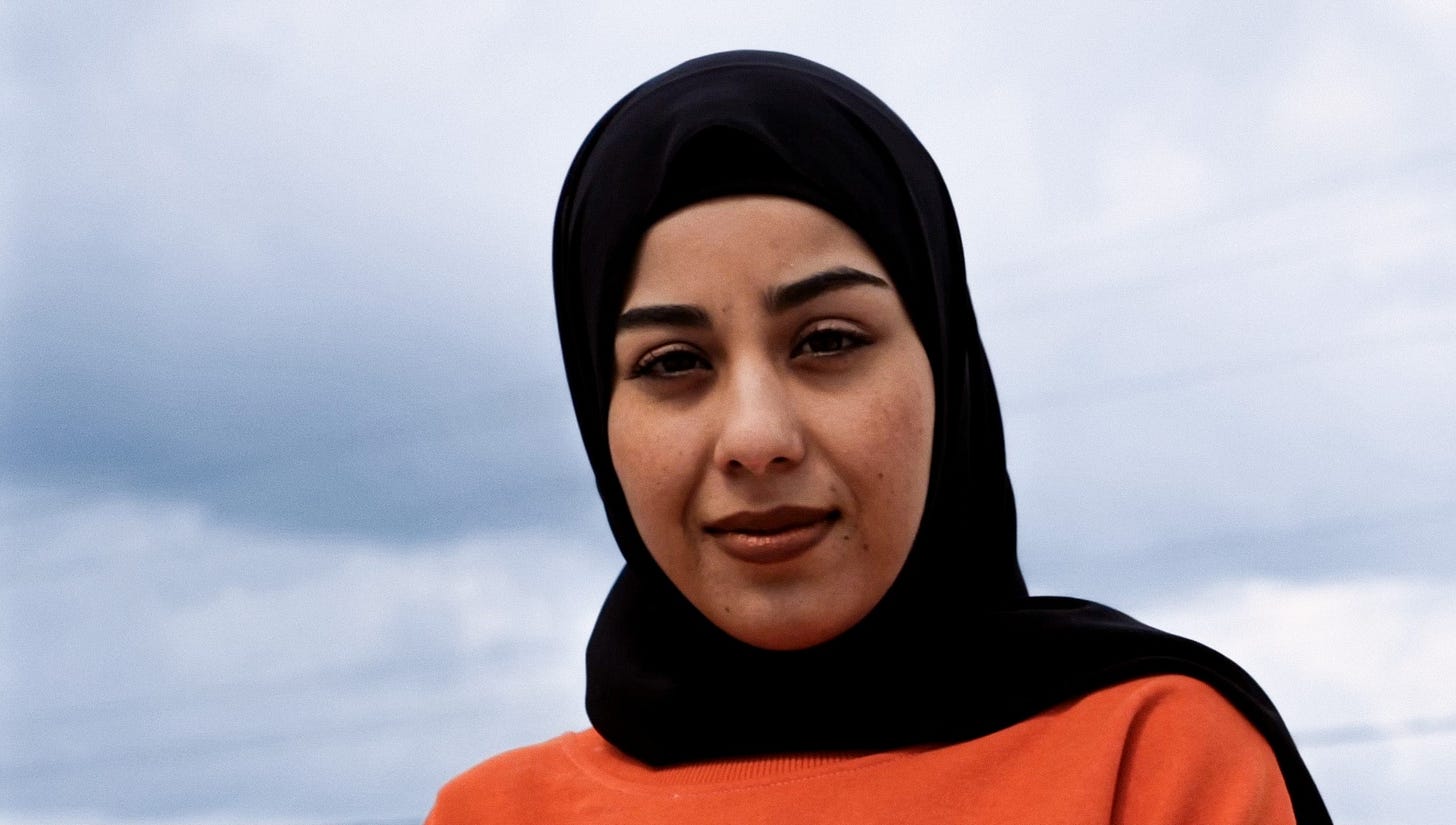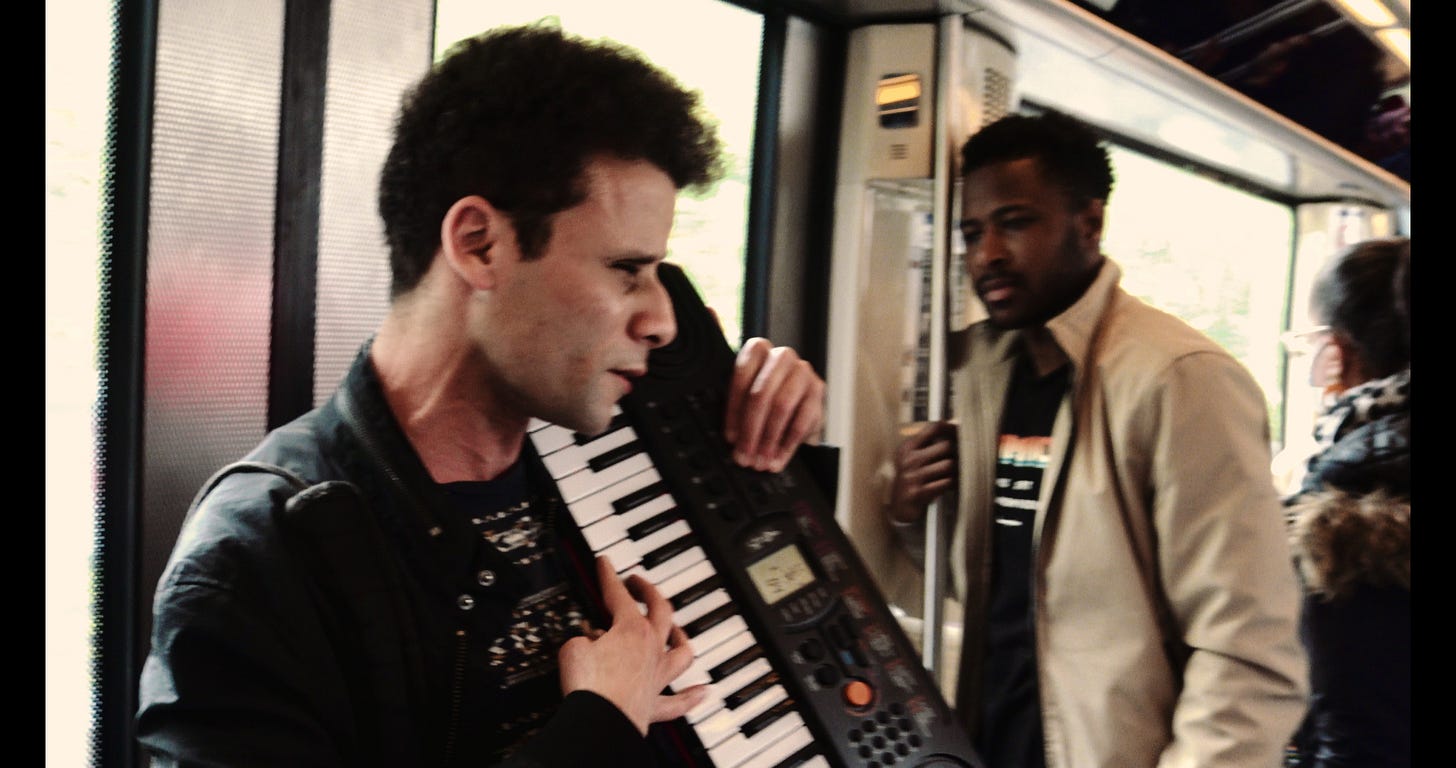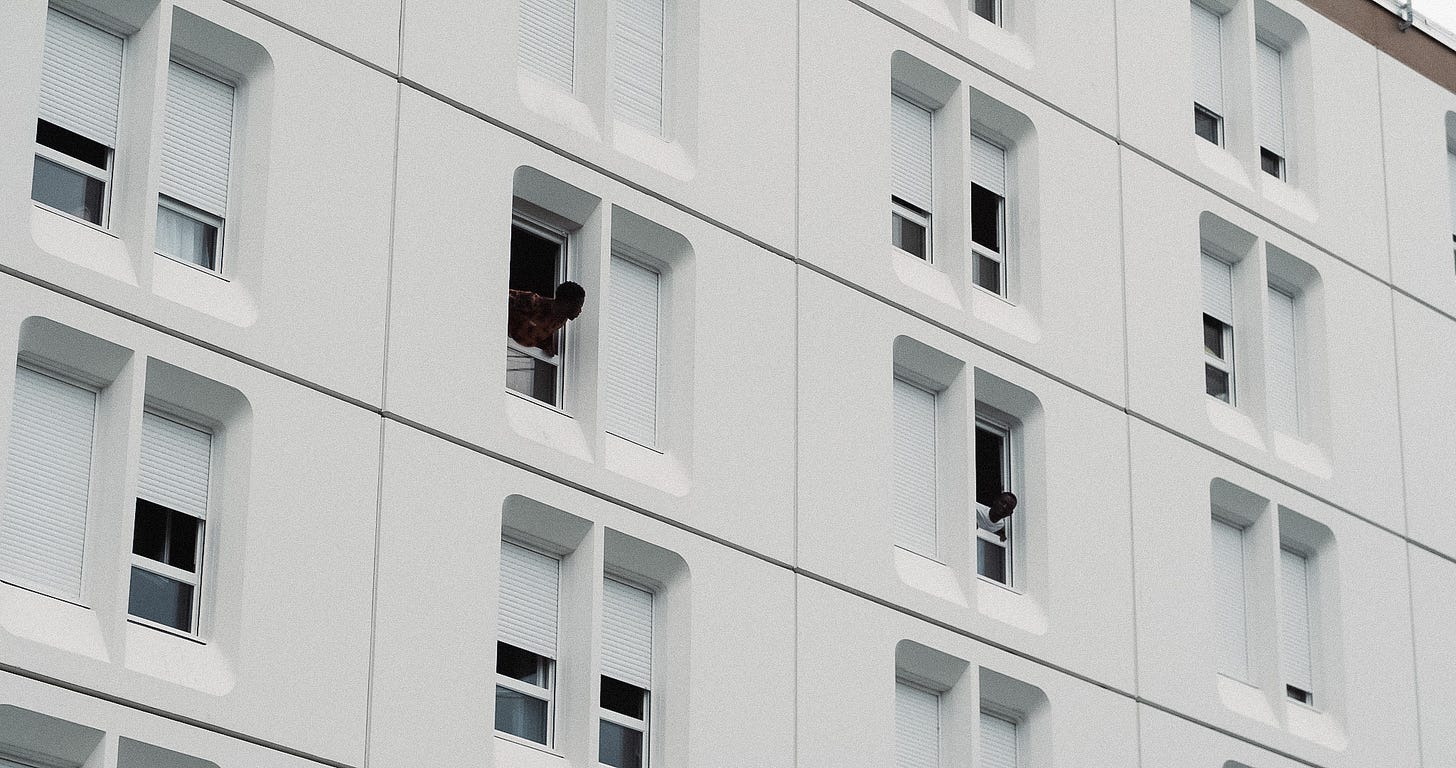Filming in Paris: Mamadou, a young migrant committed to social justice
And a video of our casting in Lebanon (To be a woman or not to be), our crowdfunding campaign teaser (we need your support🙏), portraits from the filming rush in Paris....
Progress review with Romain
Hello everyone!
The shooting in Paris is now finished! 1-month immersion in the life of Mamadou, a 26-year-old refugee from Guinea who is trying to change the way people perceive migration. Roam the street for homeless migrants, organization of a theater workshop for isolated minors supported by Utopia 56, meetings between Mamadou and scriptwriters... The first part of the film promises to be fascinating!
Today we're in Jakarta (Indonesia), in the slum of Kampung Sawah. This is a place where floods hit every year, which I invite you to discover by reading my article "Jakarta's floods: Misery is so beautiful" (In French). Climate change is set to be a key topic for the shooting in Indonesia.
The 2 coming weeks will focus on a crucial issue: looking for funding.
We have launched a crowdfunding campaign to help finance the film.
Our objective is to raise €20,000 in 40 days. Thanks to a strong ecosystem, we've already raised more than 13,000€.
We have 2 weeks left to reach our goal or we'll lose all the money .... Together we can! (If you are a French taxpayer, 66% of your donation is tax-deductible up to a limit of 20% of your taxable income.)
The more successful this campaign is, the more the film will have the means to fulfill its ambitions: to raise awareness of the lives of extraordinary young adults and to call for action against exclusion.
Share our LinkedIn and Instagram posts with the teaser: the future of the film is at stake now.
Romain fait le point :
Bonjour à tous,
Tournage à Paris terminé ! 1 mois d’immersion dans la vie de Mamadou, réfugié guinéen de 26 ans, bien décidé à faire changer les regards sur la migration. Maraudes, organisation d’un atelier théâtre pour des jeunes mineurs isolés accompagnés par l’association Utopia 56, rencontres entre Mamadou et des scénaristes… La première partie du film s’annonce passionnante !
Aujourd’hui, nous sommes à Jakarta dans le bidonville de Kampung Sawah. Un lieu frappé chaque année par les inondations, que je vous invite à découvrir dans mon article “Les inondations de Jakarta : La misère est si belle.” Le changement climatique s’annonce être un sujet phare du tournage en Indonésie.
Les semaines à venir se cristallisent autour d’un sujet crucial : la recherche de financements.
Nous avons lancé une campagne de crowdfunding pour aider le financement du film.
Objectif, 40 jours pour lever 20,000€. Les soutiens sont nombreux et nous avons déjà levé 13,000€. Il nous reste 2 semaines pour trouver les 7,000€ restants ou nous perdrons tous l’argent : on a besoin de vous !
Plus cette campagne sera réussie, plus le film aura les moyens de ses ambitions : sensibiliser à la vie de jeunes extraordinaires et appeler à l’action contre l’exclusion.
Partage nos posts LinkedIn et Instagram avec le teaser de présentation : le futur du film se joue maintenant.
Mathilde's focus: Mamadou, a Guinean refugee committed to social justice
How can we commit ourselves to a country that no longer wants us?
That's the question Mamadou, a 26-year-old refugee, asks himself. He fled Guinea Conakry after demonstrating for human rights. An activist in the opposition party IFDG (Union de Force Démocratique de Guinée), he fights against insecurity, bad governance, social injustice, and ethnocentrism. Arrested, his life is now in danger and to survive, there is only one solution: escape.

Mamadou arrived in Paris, Gare de Lyon, on 22 December 2017. He called his only contact. No answer. Now he's alone, with disillusions and new dreams, to face the future. He learns to adapt, find solutions, and bounce back.
6 years later, he has mastered Paris and its 16 metro lines, has a job and friends, most of whom he met through his involvement in voluntary organizations (outreach work, theatre workshops, etc.). He has now a big project: to make a fiction film to tell his story and that of other migrants.
Here's an extract:
“On my right is a well-dressed lady in a black dress, low heels, and a leather handbag. She's holding a phone. As I approach her, she looks at me strangely: she seems frightened. I ask her to lend me her phone so that I can make a call if possible. She hesitates. I explain that I've only just arrived, I don't know anyone and I don't know where to go. "A friend was supposed to be waiting for me at the station but I can't find him. And I don't have any credit to call him... "
A podcast with Mamadou will be released on our social networks in the next few days. Follow us so you don't miss it!
Le focus de Mathilde : Mamadou, un réfugié guinéen engagé
Comment s’engager pour un pays qui ne veut plus de nous ?
C’est la question que se pose Mamadou, réfugié de 25 ans. Il a fui la Guinée Conakry après avoir manifesté pour les droits de l’homme. Militant dans le parti de l’opposition, l’IFDG (Union de Force Démocratique de Guinée), il combat l’insécurité, la mal gouvernance, l’injustice sociale, l'ethnocentrisme. Arrêté, sa vie est désormais en danger. Pour survivre, une seule solution : fuir.
Mamadou arrive à Paris, gare de Lyon, le 22 décembre 2017. Il appelle son unique contact. Pas de réponse. Le voilà seul, avec des désillusions et des nouveaux rêves, pour affronter l’inconnu. Il apprend à s’adapter, trouver des solutions, rebondir.
6 ans après, il a apprivoisé Paris et ses 16 lignes de métro, a un travail, des amis rencontrés pour la plupart au travers d’associations dans lesquelles il s’engage (maraudes, ateliers de théâtre ..). Il a surtout un grand projet : réaliser une fiction pour raconter son histoire et celle d’autres migrants.
En voici un extrait :
A ma droite une dame bien habillée : robe noire, petits talons et sac en cuir. Elle tient un téléphone. Alors je l’approche, elle me regarde bizarrement : elle a l’air effrayée. Je lui demande de me prêter son téléphone afin que je puisse passer un coup de fil si cela est possible. Elle est dans l’hésitation. Je lui explique que je viens à peine d’arriver, que je ne connais personne et que je ne sais pas où aller. « Un ami devait m’attendre à la gare mais je ne le trouve pas. Et je n’ai pas de crédit pour l’appeler… »
Un podcast avec Mamadou va sortir dans les jours à venir sur nos réseaux sociaux. Suis-nous pour ne pas le manquer !
>> Nous suivre sur Instagram >> Nous suivre sur LinkedIn
Switch of focus: Rachel presents To be a woman or not to be
In this video, based on interviews from Lebanon, 11 young Lebanese and Syrian women share their difficult experiences of what it means to be a woman today.
Early marriage, difficult access to education and decent work, deprivation of freedom, the impossibility of divorce... They talk about the obstacles women face in their communities.

These eleven young women are an example of courage and determination, aware that they are the first to be able to change things.
"Fight for your rights!” Rana Mahmoud
"At least I'm trying to change things, to prove that women are capable of anything" Rahaf Mahmoud
Changement de focale : Rachel présente To be a woman or not to be
Dans cette vidéo, montée à partir d’interviews pris au Liban, 11 jeunes femmes libanaises et syriennes partagent leurs réalités, parfois difficiles, sur ce que signifie être une femme aujourd’hui.
Mariage précoce, accès difficile à l’éducation et au travail décent, privation de liberté, impossibilité de divorcer... Elles témoignent des obstacles auxquels les femmes font face au sein de leur communauté.
Ces onze jeunes femmes sont un exemple de courage et de détermination, conscientes d’être les premières à pouvoir faire bouger les lignes.
“ Battez-vous pour vos droits !” Rana Mahmoud
“Au moins j’essaie de changer les choses, de prouver que les femmes sont capables de tout” Rahaf Mahmoud
>> Voir To be a woman or not to be
Gwen's portraits
Abid and Abdoul are two Afghans who recently arrived in France and whom Rachel met on street outreach. They are living temporarily under a bridge in Clichy, waiting for the long administrative procedures to be completed.
Abid et Abdoul sont deux Afghans arrivés depuis peu en France que Rachel a rencontrés lors d’une maraude. Ils vivent temporairement sous un pont à Clichy dans l’attente que les longues démarches administratives arrivent à leurs termes.
Marianne, the scriptwriter, is on the left, Mamadou in the center, and Olivier Tyberg on the right. Doubting the background of the character Ali (a character in the film written by Mamadou), they ask for help from a Marseilles tarot card reader. What will the cards do to the mysterious character?
Marianne, scénariste, à gauche, Mamadou au centre et Olivier Tyberg à droite. Doutant sur le parcours du personnage d’Ali (un personnage du film écrit par Mamadou), ils demandent l’aide impromptue d’un tireur de cartes de tarot Marseillais. Qu'est ce que les cartes vont faire faire au mystérieux personnage ?
Mohamed Lamouri, from Tlemcen in Algeria, is an artist that Line 2 customers know well, as Mohamed has been playing there for years. He has since found a producer for his second album. This artist offered us a great moment during eight stops in the presence of Mamadou.
Mohamed Lamouri, originaire de Tlemcen, en Algérie un artiste que les habitués de la ligne 2 connaissent bien, puisque Mohamed y joue depuis des années. Depuis il a trouvé un producteur pour son deuxième album. Cet artiste nous a offert un beau moment durant huit arrêts en présence de Mamadou.
In Coignières, at Mamadou's house, we improvise a sequence with his close friend Lamarana. They are not only neighbors, they have followed each other on their long journey from Guinea to France.
A Coignières, chez Mamadou, nous improvisons une séquence avec son ami proche Lamarana. Il ne sont pas seulement voisins, ils se sont suivis durant leurs long périple depuis la Guinée jusqu'à la France.







